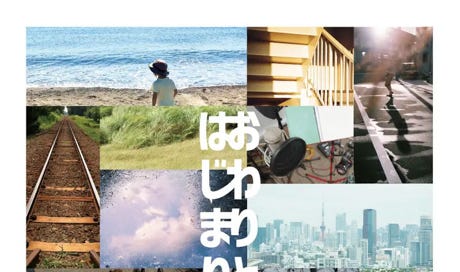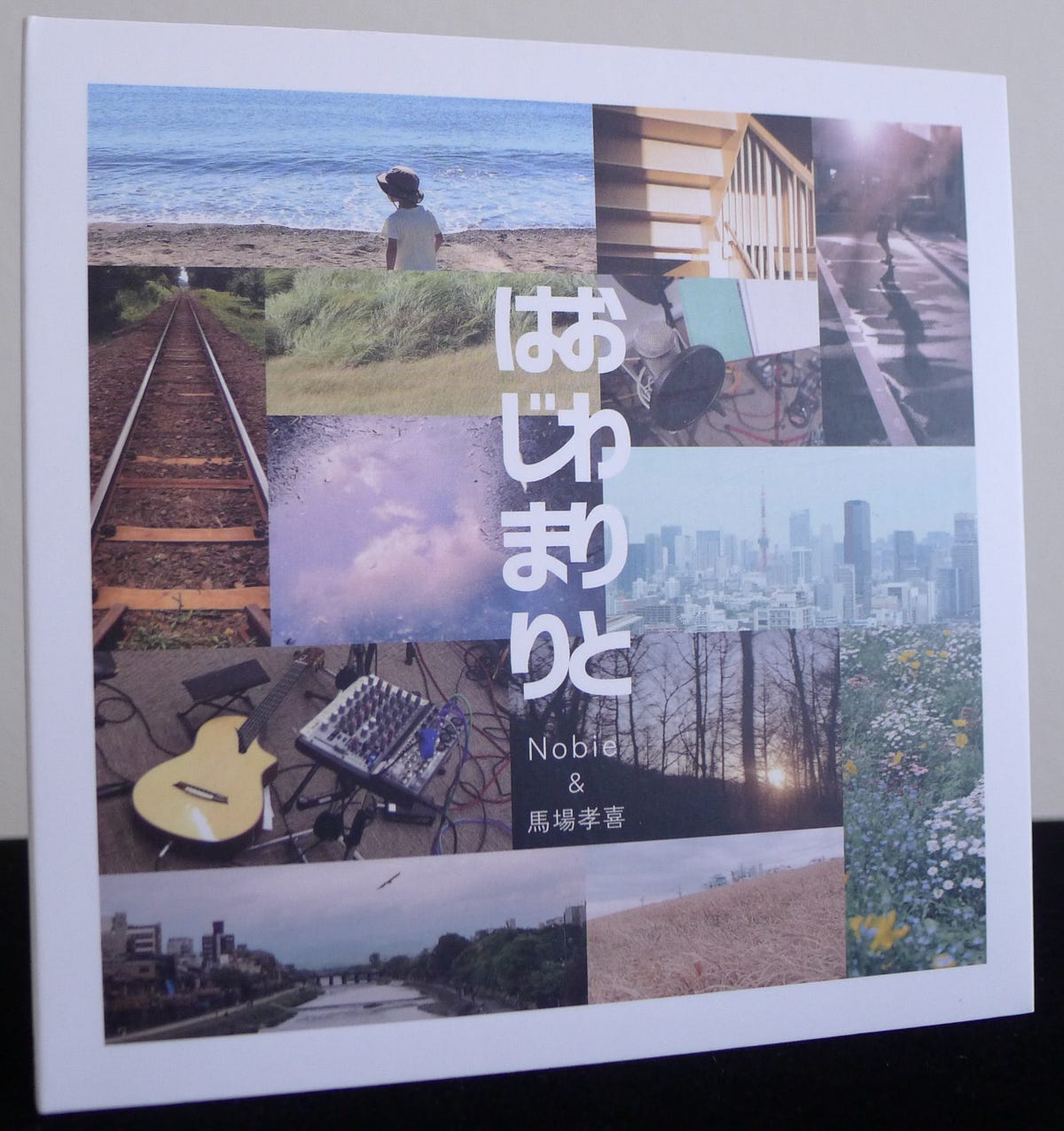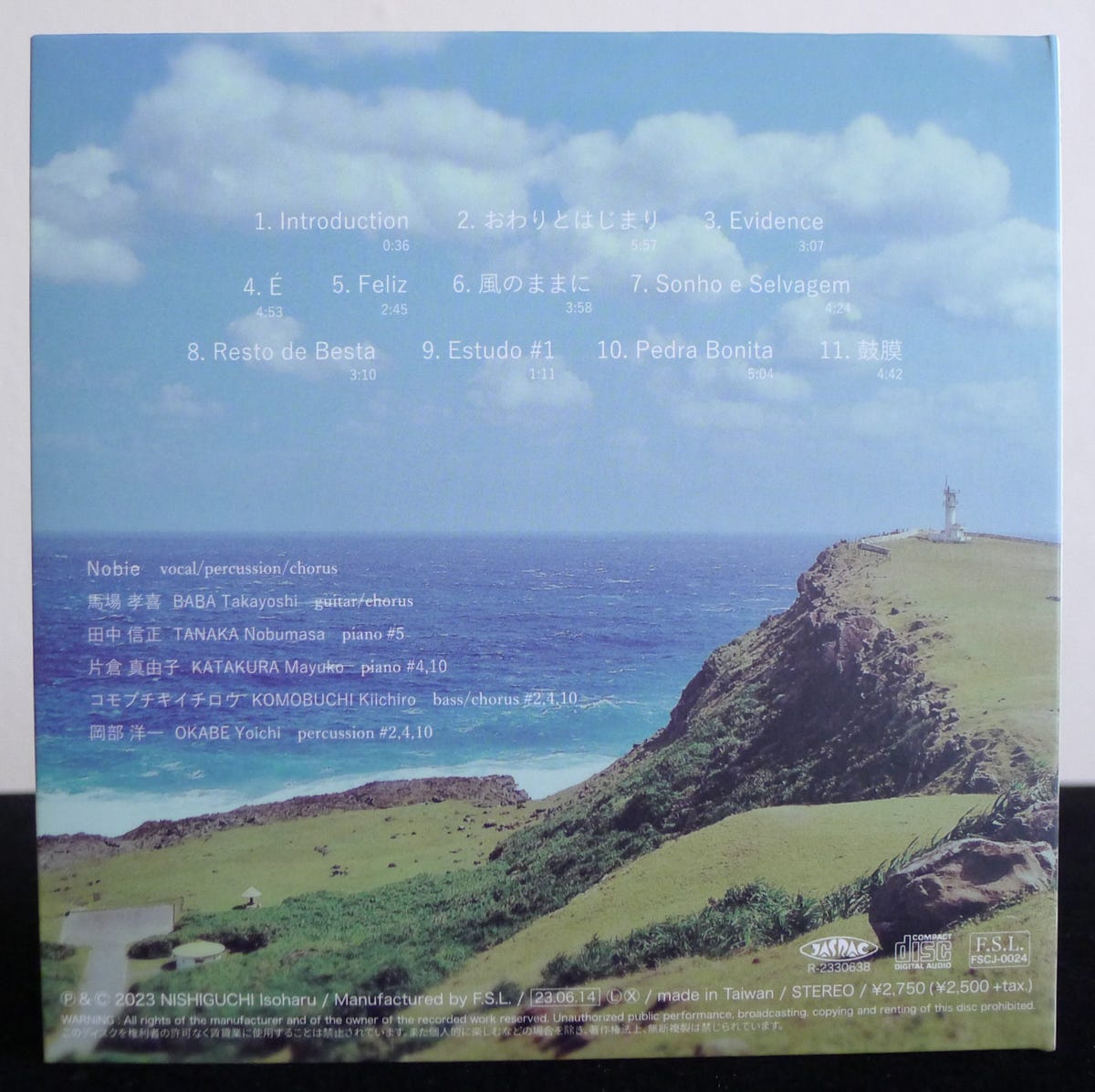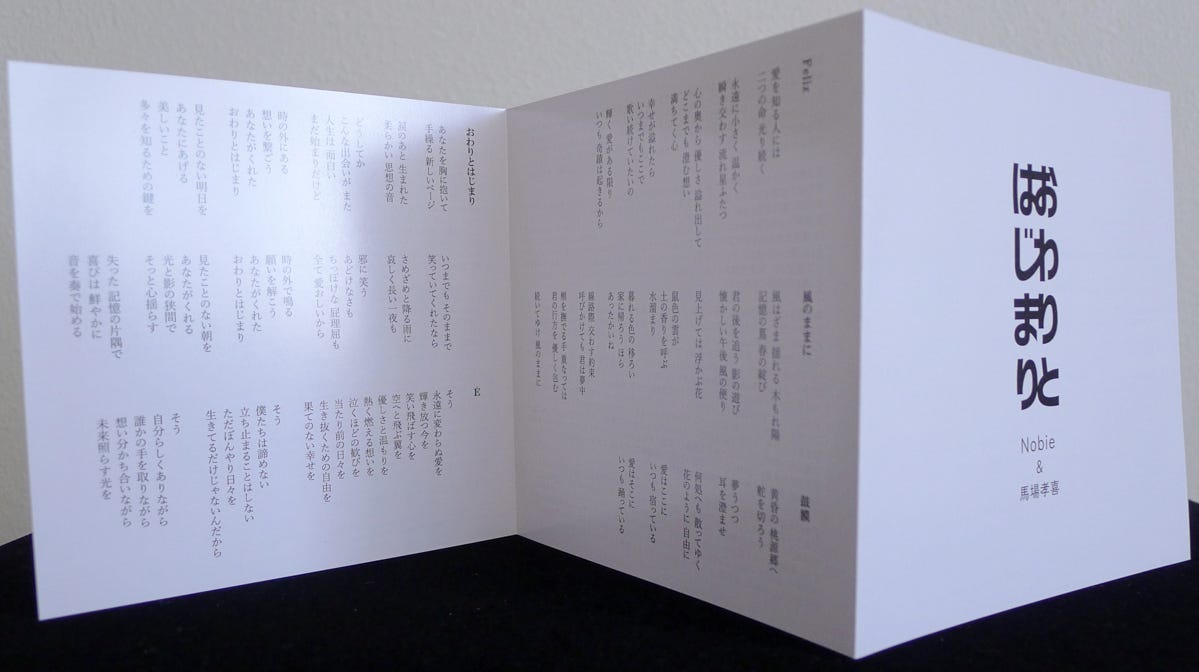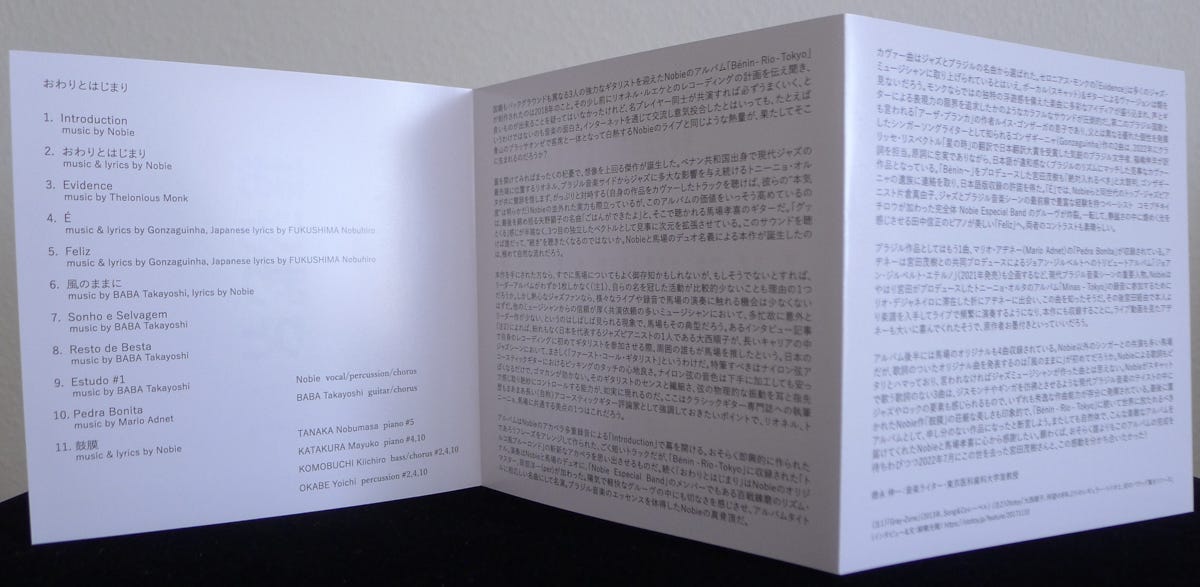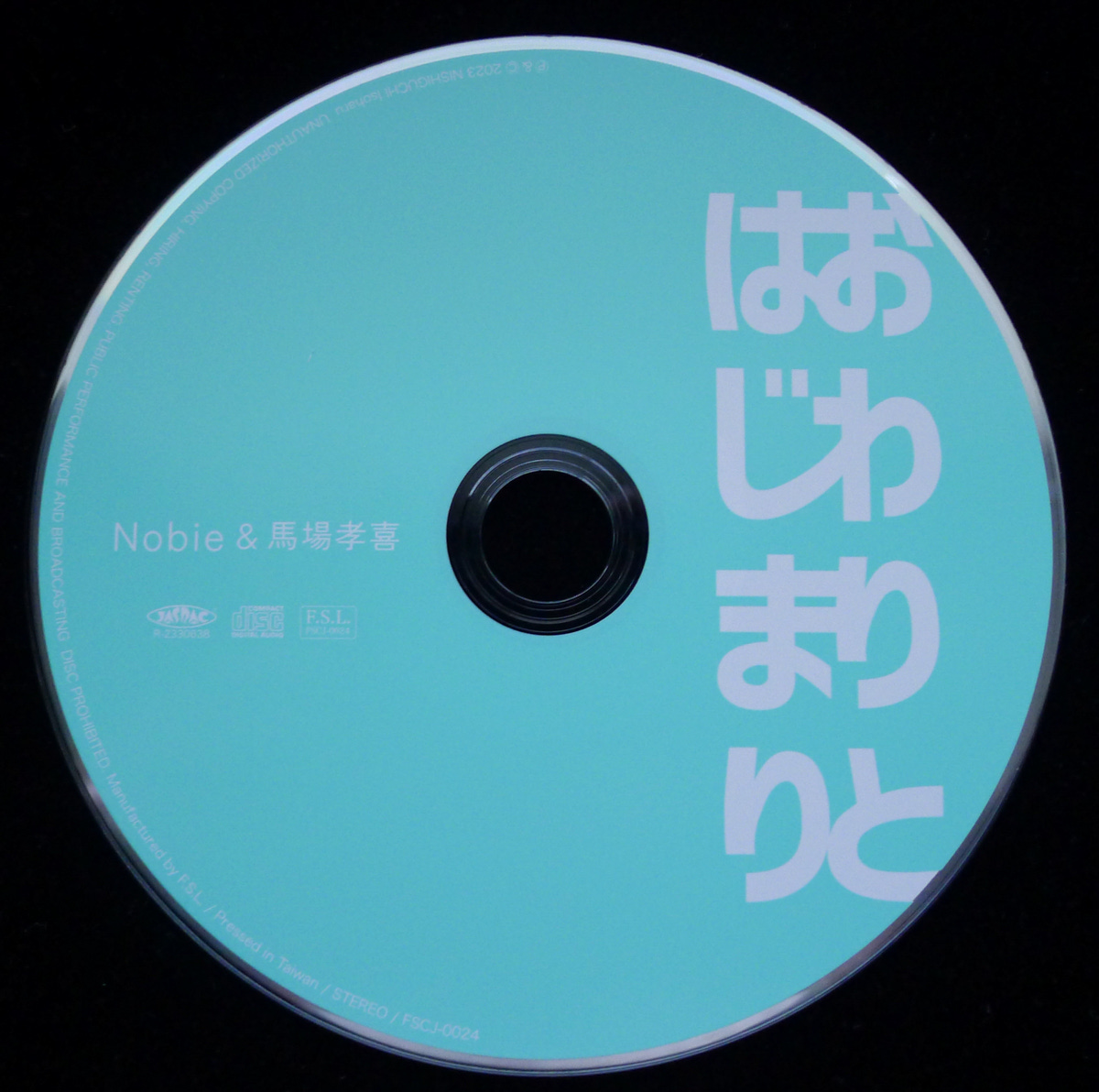Nobie & Takayoshi Baba: Owari to Hajimari
Owari to Hajimari (The End and the Beginning) is a new album from the duo of vocalist Nobie and guitarist Takayoshi Baba. Released in 2023, this disc features forty minutes of music written and adopted from the duo’s repertoire and experience playing jazz, pop, and Brazilian music together.
The two have released their own leader albums and recordings with other groups, but this is the first album to be released under their co-named band partnership and builds on their vast experience playing together in various settings.
Four of the eleven songs are covers taken from jazz and Latin music. The one tune lifted from the jazz songbook is Thelonious Monk’s “Evidence”. This is an inspired jazz choice for a duo and the result is great—a nicely arranged and precisely played guitar-vocal version of the addictive and off-kilter tune.
The three other cover songs are pulled from Brazilian music, with track 5 “Feliz” and 4 “É” by the singer-songwriter Gonzaguinha, and track 10 “Pedra Bonita” by the composer Mario Adnet. The latter two songs are particularly energized by a full quintet sound with members of the group “Nobie Especial Band” joining on piano, bass, and percussion to lay out entrancing rhythms for the guitar and voice acrobatics.
When not scat-singing on these songs, Nobie sings lyrics that have been translated into Japanese, adding another unique twist to the mix of Brazil and Japan that Nobie embodies so well.
The seven original songs are led by the album opener “Introduction”, a short and wordless vocal welcome that sets the stage with Nobie’s vocal overdubs and percussion. The riff turns through a hypnotic cycle over a slippery beat, similar to some of the music she creates with another of her groups, the trio Les Komatis.
Tracks 6 through 9 are four of guitarist Takayoshi Baba’s songs played by Baba and Nobie as a duo. The songs are a blend of soulful pop, quick and technical phrases played in unison, dreamy spaces, dazzling scatting, and a short etude as an impressive vocal-guitar workout. While #6 “Kaze no Mama ni” includes Japanese lyrics, Nobie scat-sings and vocalizes as an instrument on tracks 7, 8, and 9, playing in unison with Baba’s guitar or voicing the melody at different times. Baba’s classical guitar with fingerstyle virtuosity elevates the Latin, jazz, and contemporary fusion like a version of The Guitar Trio of Paco de Lucía, John McLaughlin, and Al Di Meola, particularly when Baba overdubs his guitar solos over his rhythm-playing and fingerpicking.
Nobie’s golden sweet voice is ever charming, deceptively soft but ultra dynamic, and powered by a nimble and quick lightness that leaps effortlessly above a foundation of a locked-in sense of time and rhythms. In certain songs, Nobie will also often add claps, slaps, hand percussion, or vocal pops, clicks, and percussive sounds for added rhythmic layers, sometimes even simultaneously while singing.
Like the album’s opener, the final song, track 11 “Komaku” (eardrum), departs slightly from the rest of the music. This parting song creates a wide open, ambient space for the album’s outro with lush guitar delays and effects drawing a spellbinding mood similar to her tune “Loop” on her debut album Primary.
Liner Notes
(Translated from Shinichi Tokunaga’s original Japanese liner notes.)
In 2018, Nobie created her album Bénin-Rio-Tokyo featuring three powerful guitarists with different nationalities and backgrounds. Shortly before this, I had heard of her plans to record with Lionel Loueke, and I had no doubt that something great would result from that. But an interesting thing about music is that no matter how great the players are, it doesn’t necessarily always work out when they play together. Despite interacting and hitting it off through the internet, will they be able to generate the same energy as seen at Nobie’s past performances at Aoyama’s Praça Onze, say, where the audience would become one with the band with the incandescence of white heat?
Based on the results when that album was released, these fears were completely unfounded, and a masterpiece exceeding expectations was born. Lionel hails from the Republic of Benin and is at the forefront of modern-day jazz. Toninho Horta continues to provide a great influence on jazz from the Brazilian music side. The two together play off each other’s strengths without holding back, fully engaged and solidly facing off with mutual respect (if you listen to the tracks where they cover their own songs, their level of commitment is clear). Nobie’s extraordinary ability also stands out, and Takayoshi Baba’s guitar playing on the album closer, Akiko Yano’s famous song “Gohan ga Dekita yo”, enhances the merits of this album even more. There’s an overpowering feeling of being moved by this third independent vector that expands the dimensions beautifully. Anyone who listens to this sound would probably want to hear more. Releasing this new album under the duo name of Nobie and Baba is an extremely natural progression.
Those listeners who have picked up this album must already be quite familiar with Baba. But if not, one reason for any unfamiliarity may be due to his only having released one album under his name (note 1) and a relatively low level of activity with his name in the lead position. However, the opportunities for avid jazz fans to have come into contact with Baba are not few due to his many and various live performances and recordings. It’s not uncommon that a reliable musician will keep a packed schedule, being a trusted musician who is often asked to perform with other musicians. As a result, they can end up being so busy that they have an unexpectedly low number of their own leader albums. Baba fits that example.
According to an interview in one article (note 2), when Junko Onishi (undoubtedly one of Japan’s most famous jazz pianists) wanted a guitarist to join her on a recording for the first time in her long career, everyone around her recommended Baba. He is truly a first-call guitarist in the jazz scene in Japan. The nice feeling of the touch of his picking on a nylon string acoustic guitar is worth special mention. There’s no hiding the tone of poorly played nylon strings even through processing, and it can end up sounding cheap. This guitarist’s sense and delicacy, and his ability to perfectly perceive and control the physical vibration of the strings through his ears and fingertips, are easily apparent. This is a virtue that is shared by Lionel, Toninho, and Baba, a point that I would love to emphasize as a writer with a fairly long (self-proclaimed) career as an acoustic guitar music critic writing for classical guitar publications.
The album begins with Nobie’s overdubbed a cappella vocals on “Introduction”. This very short track may have been arranged from a suddenly improvised phrase, and it reminds me of her innovative a cappella version of “Blue Rondo a la Turk” on Bénin-Rio-Tokyo. The next song is “Owari to Hajimari”, an original composition by Nobie. The performance features the duo of Nobie and Baba with the addition of the rhythm master Yoichi Okabe (percussion), a veteran member of the “Nobie Especial Band”. The song has a light and lively groove, but there is also a sense of painful longing. It’s a masterpiece and a superb performance worthy of the album title. This is Nobie’s authentic self as someone who has mastered the essence of Brazilian music.
The cover songs were selected from well-known jazz and Brazilian classics. Thelonious Monk’s “Evidence” is often taken up by jazz musicians, but a vocal scat and guitar version may be unprecedented. The special weightless feeling of Monk’s music is full of many vivid ideas, and the colorful sound of voice and guitar pushing the limits of expression is overwhelming.
Two songs were written by Gonzaguinha, a singer-songwriter who exhibited an excellent yet distinct individuality from his father Luiz Gonzaga, composer of the song “Asa Branca” which is known as Brazil’s second national anthem. The Japanese lyrics were translated by an emerging scholar of Brazilian literature, Nobuhiro Fukushima (福嶋伸洋), who in 2022 was awarded the Grand Prize in Japan’s Best Translation Award for his translation of Clarice Lispector’s The Hour of the Star. While remaining faithful to the original lyrics, the Japanese words match the Brazilian rhythms flawlessly and make these songs even more attractive as covers. Shigeki Miyata (宮田茂樹), who produced Bénin-Rio-Tokyo, gave his stamp of approval by saying “These songs definitely need to be included” and contacting the family of Gonzaguinha to obtain permission for use of the Japanese versions of the lyrics. The full Nobie Especial Band groove is bursting on “É” with the addition of a top jazz pianist from Nobie’s generation Mayuko Katakura, and bassist Kiichiro Komobuchi, who has rich experience at the forefront of the jazz and Brazilian music scenes. “Feliz” leads to an about-face as the beauty of Nobumasa Tanaka’s piano creates a sense of glittering light within the tranquility. The contrast between the two tracks is wonderful.
The album includes one more Brazilian song in Mario Adnet’s “Pedra Bonita”. Adnet is an important figure in the contemporary Brazilian music scene and has worked on projects such as João Gilberto Eterno, the João Gilberto tribute album from 2021 which he co-produced with Shigeki Miyata. While Nobie was staying in Rio de Janeiro to participate in the recording of Toninho Horta’s album Minas-Tokyo (also produced by Miyata, incidentally), she met Adnet there and seems to have learned about this song then. Later, Nobie obtained the sheet music from Adnet through Miyata and began to perform this song regularly at live shows. This led to the song being included in this album. Upon seeing videos of those live performances, Adnet seems to have been greatly pleased, as he has stamped his seal of approval as the song’s original composer.
The second half of the album also contains four of Baba’s original songs. Baba has performed with many other singers in addition to Nobie, but “Kaze no Mama ni” is the first original song of his that he’s released with lyrics. Nobie’s lyrics fit perfectly, and if you weren’t told otherwise, you wouldn’t have thought that this song was written by a jazz musician. Three of these songs are lyric-less, and Nobie sings in a scat style. There is a taste of modern Brazilian music reminiscent of Gismonti and Ginga with elements of jazz and rock contained within, and each is an unreserved demonstration of Baba’s superb compositional talent.
With the grand beauty and impact of the final song, Nobie’s “Eardrum”, this album can be declared perfect. It’s an album that follows in the footsteps of Bénin-Rio-Tokyo and should be released into the world. I would like to once again express my sincere appreciation to Nobie and Baba for delivering such a magnificent album so naturally. I only wish that I could have shared my feelings with Shigeki Miyata, who departed from this world in July 2022, and who was probably eagerly awaiting this album’s completion more than anybody else!
Shinichi Tokunaga (徳永 伸一): Music Writer, Associate Professor at Tokyo Medical and Dental University
Note 1: Gray-Zone (2013, Song&Co label)
Note 2: Ototoy “Junko Onishi releases her long-awaited first collection of ballads with her regular trio after 8 years” (interview and text: Mitsutaka Nagira [柳樂光隆]) https://ototoy.jp/feature/20171110
Owari to Hajimari by Nobie & Baba Takayoshi
Nobie - vocal/percussion/chorus
Takayoshi Baba - guitar/chorus
Nobumasa Tanaka - piano (#5)
Mayuko Katakura - piano (#4, 10)
Kiichiro Komobuchi - bass/chorus (#2, 4, 10)
Yoichi Okabe - percussion (#2, 4, 10)
Released in 2023 on F.S.L. as FSCJ-0024
Japanese names: Nobie ノビー (Nobie) Takayoshi Baba 馬場孝喜 (Baba Takayoshi) Nobumasa Tanaka 田中信正 (Tanaka Nobumasa) Mayuko Katakura 片倉真由子 (Katakura Mayuko) Kiichiro Komobuchi コモブチキイチロウ (Komobuchi Kiichiro) Yoichi Okabe 岡部洋一 (Okabe Yoichi)
Related Albums
Nobie: Primary (2011)
Trigraph: Fever (2014)
Les Komatis: Les Komatis (2015)
Nobie: Bénin Rio Tokyo (2018)
Duo Tremolo: Resonance (2019)
Links
Audio and Video
Nobie and Baba on a 2023 album tour with live versions of #2 “Owari to Hajimari”, #4 “É”, #6 “Kaze no Mama ni”, #9 “Estudio #1”, #10 “Pedra Bonita”, and other songs
Excerpt from “Owari to Hajimari”, track #2 on this album:

